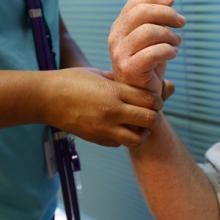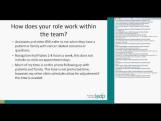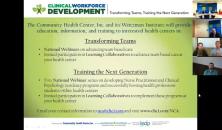Why is it important to rethink the role of the RN?
The role of registered nurses (RNs) in primary care has evolved a great deal in the last 50 years. Competition from hospitals for quality nurses and the corresponding rise in nurses’ compensation have caused many primary care practices to cut RN staff or find ways to maximize their value and productivity. RNs provide a unique set of clinical and management skills, that when used to their fullest potential, can enhance the primary care team and improve patient care. This topic focuses on the role of RNs as core members of a primary care team. Another important role for RNs is as specialized providers of care management for patients who have complex or chronic health problems. (Please see the Care Management topic if you are interested in this more specialized RN role.)
How should the role of the RN change?
It is important to ensure that RNs are doing work that is uniquely suited to their training and expertise. In turn, other staff members need to take on some of the work that RNs have traditionally done, such as answering phones and phone triage, simple procedures, basic health education and health coaching, and patient outreach for preventive care.
Tasks that maximize the RN role include:
- Complex care management.
- Leadership of care teams/Team lead.
- Shared visits with providers for well visits, preventive care visits, or visits with complex patients.
- Running specialized care services, such as programs for obstetrics patients that provide additional support through extra consultation and support groups.
- Providing independent visits and medication titration by protocol.
Given the many changes that RNs in primary care have undergone, it is understandable that many may be wary of change. But for their role in primary care to remain viable, RNs need to adapt and change along with the care team.
What do we gain by making these changes?
RNs bring a deep set of clinical skills and a desire to participate in direct patient care. It is imperative for both the fiscal health of primary care and RN job satisfaction to make the best use of their clinical skills on primary care teams. When providers and RNs work together, it allows a practice to offer longer, more comprehensive visits for chronically ill patients—while freeing up the provider to do tasks at the top of their license.
- Assess what RNs are currently doing in your practice.
The first step in changing the role RNs play on a primary care team is to assess the specific tasks that each member of the team is currently doing. This may expose tasks and functions that RNs can shift to other team members in order to free up their time for new tasks and responsibilities.
- Offload work that can be done by other team members.
In order to work at the top of their license, it is critical for RNs to transfer tasks that the RNs might have traditionally performed to other staff members.
- Develop phone triage protocols that put other team members as the first point of contact.
Traditionally RNs have been the primary contact for patients calling into primary care clinics with health-related questions. With improvements in technology, team-based communication, and evidenced-based guidelines, it should be possible to reduce the time RNs spend doing phone triage.
- Provide RNs with tasks that maximize their clinical skills.
As discussed above, there are a number of tasks that RNs can do as a member of their primary care team that maximize their clinical skills and training, and improve the efficiency of the primary care team.
- Hire the right person.
As you shift the role of RNs in your clinic you may find you need more RNs or that there is a need to find individuals with a different skills set. LEAP sites often emphasized hiring individuals based on attitude rather than specific skill sets.
- Provide training and supervision.
While RNs have generally had rigorous training, it may be important to offer your RN staff additional training on specific clinical and leadership skills. Topics might include motivational interviewing, disease-specific clinical skills, or facilitative leadership.
Webinar and power point presentations
Role featuresJob descriptions, career ladders and other HR materials
Publications
WorkflowTemplates, flow sheets and mapping aids
LEAP Learning ModuleOther helpful topics included in this website
Clinical protocolStanding orders, risk stratification forms and hospital transition protocols
Staff trainingTutorials, training manuals, etc.
If you have a question about the improvements, action steps, or tools & resources in this module please let us know. We're here to help. And if we can't answer your question, we can probably connect you with someone who can.










